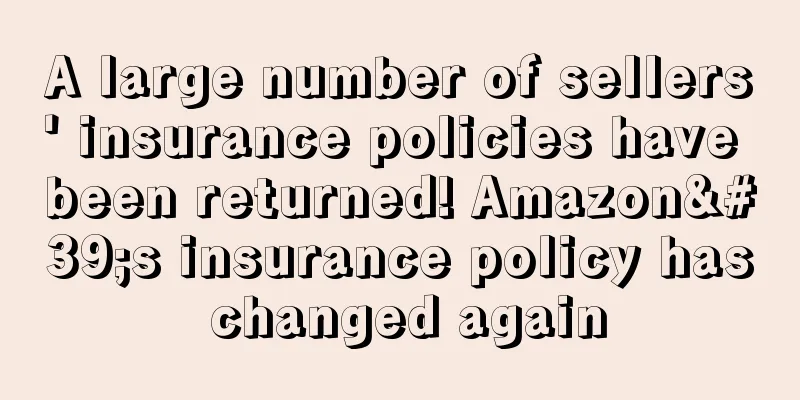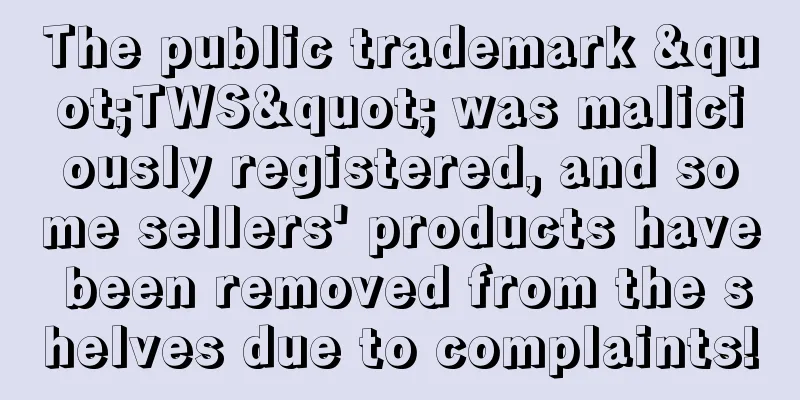A large number of sellers' insurance policies have been returned! Amazon's insurance policy has changed again

|
Amazon’s insurance requirements have been upgraded and sellers can no longer renew their insurance as before.
According to Amazon's timeline, a group of Amazon sellers purchased insurance before the end of August last year. Recently, when their insurance was due for renewal, they received an email saying that the policy had been rejected and returned. According to the platform's new requirements, sellers need to submit a policy with no deductible. Sellers said: costs have increased again!
A batch of Amazon seller insurance policies were returned
Yesterday, an Amazon seller said that he used his personal information to purchase insurance last week and confirmed that the insurance company name, date and other information were correct. Two days after submitting the information, he received an email from the backend stating that the insurance policy could not be approved.
Another seller also expressed confusion: "I bought insurance from an agent, but now Amazon's backend prompts that it cannot be verified and needs to be re-uploaded. Is it that the insurance I bought from the agent is not good, or is there something wrong with the insurance sold by the agent?"
Sellers who have encountered such problems recently are not isolated cases. Many sellers encountered problems when purchasing insurance and submitted insurance policies normally, but were rejected by Amazon.
Amazon informed the seller in the return email that the commercial liability insurance you submitted could not be approved because Amazon could not verify the corresponding insurance policy. After receiving the email, most sellers panicked. One seller said, "The insurance of several of my accounts are about to expire, and I am worried that the policy will be returned when I buy insurance."
It is understood that almost all sellers who received the return emails were those who recently purchased insurance. Since June 16, there have been sellers whose policies have not passed the review every day. And for sellers who recently purchased insurance, not all policies will be returned. Some can pass smoothly, while others cannot.
The sellers who passed the review successfully basically submitted their policies before June 15, while those who submitted their policies after June 15 were almost all rejected.
Why would a seller's normally renewed insurance policy be returned? According to professionals, the key message in Amazon's email is that your insurance policy has a liability deductible.
Previously, Amazon sellers submitted insurance policies with deductible plans, and the deductible was set at US$10,000. The insurance company would only start paying claims when the loss exceeded US$10,000. Now Amazon no longer accepts deductible policies and requires sellers to purchase insurance without a deductible. Even if a loss of one dollar occurs, as long as there is a claim dispute, the insurance company must pay compensation. This is an improvement in the platform's protection plan, and sellers and platforms will be more strongly protected in the future.
The person analyzed that sellers whose insurance policies have been returned do not need to panic. It is not that the insurance they purchased is non-compliant, but that Amazon has new requirements, requiring sellers to purchase insurance without deductibles.
Insurance companies raise prices, and sellers’ costs will increase again
Recently, sellers' insurance policies have been returned in batches, which coincides with the expiration of many people's insurance policies. Starting from September 1 last year, Amazon required sellers with sales of US$10,000 for three consecutive months to purchase product liability insurance. With the implementation of this regulation, sellers who met the requirements basically completed insurance by the end of August last year.
Sellers who completed insurance purchases at the end of August last year have recently received emails from Amazon informing them that the insurance they purchased has expired or is about to expire and that they need to renew their existing commercial liability insurance and submit proof of insurance policy within 30 days.
When most sellers received emails to renew their insurance, Amazon upgraded its new requirements, so a large number of sellers’ renewal policies were returned.
According to people familiar with the matter, although Amazon has not yet announced the need to purchase unlimited insurance, the actual situation for sellers is indeed like this. It is possible that this requirement of the platform is in the testing phase, and sellers under certain conditions in the future may need to purchase insurance according to the new requirements.
In addition, Amazon does not require all sellers to purchase non-deductible insurance, but has a cutoff point of $1 million. According to the platform's relevant standards, if the seller's sales exceed $1 million, they can continue to have the previous deductible insurance. If the sales are less than $1 million, they must provide a non-deductible policy.
One seller lamented: "The deductible insurance I purchased previously has now become deductible-free, which requires a lot of extra expenses. Amazon requires sellers to pay for everything!"
Regarding the upgraded insurance costs, Ennet consulted with professionals from Ping An Insurance. They said that Amazon requires the purchase of non-deductible insurance. When a loss of less than $10,000 occurs, sellers and the platform do not have to bear the cost themselves, but the insurance company does. The cost for the insurance company will also be higher, and the insurance company will increase the premium accordingly. Recently, many insurance companies have also ushered in a wave of price increases.
However, the increase in Ping An is not that big. Previously, the cost of buying a deductible insurance was about 1,600 yuan, but now the cost of a non-deductible insurance is just over 2,000 yuan. Sellers whose policies are returned can pay the difference and upgrade to a non-deductible policy.
Amazon's insurance policies are gradually tightening
This time, Amazon has further upgraded its insurance requirements for sellers, and the platform's insurance policies are also being tightened step by step.
Initially, Amazon required sellers with sales of $10,000 for three consecutive months to purchase product liability insurance. Later, Amazon expanded the coverage of insurance so that sellers would need to provide proof of insurance if their sales exceeded $10,000 a month. Finally, some sellers found that their newly opened stores had monthly sales of less than $10,000, but they still received notices from Amazon asking for proof of insurance.
After the insurance coverage has become more comprehensive, Amazon has now reduced the amount of the policy to 0 yuan, and compensation will be paid as long as a dispute occurs. While further protecting the rights of buyers, the platform is also constantly putting pressure on sellers, increasing their sales costs.
However, as an Amazon seller, if you receive a notice from the platform to purchase insurance, you must basically purchase insurance. If you do not purchase effective insurance in time, you may be restricted from selling goods in a specific category or even have your account suspended.
In order to sell their accounts normally, Amazon sellers need to submit insurance policies according to relevant requirements. When buying insurance, sellers have many channels to choose from, and some sellers fall into traps because they are greedy for cheap prices.
In March of this year , POE insurance exploded. Many sellers who purchased POE insurance received urgent notices from Amazon, informing them that the insurance policy marked on their insurance certificate did not exist and that they needed to purchase a new commercial insurance policy, which triggered collective rights protection actions by sellers. About two weeks ago, the POE policies purchased by many sellers suddenly expired. POE sent an email to inform the sellers that they must immediately pay the insurance policy fee of US$50, otherwise their Amazon seller accounts may be suspended.
After repeated problems, many sellers who purchased POE insurance changed companies and repurchased. They originally wanted to buy it at a lower price, but in the end they had to pay an extra fee. Therefore, sellers must choose formal channels when purchasing insurance.
Ping An Insurance is an insurer officially recognized by Amazon. Currently, it has prepared a no-deductible insurance plan for sellers. Sellers who need to renew their insurance can purchase it directly through Ping An channels. Sellers who have already purchased and whose policies have been returned do not need to worry, as Ping An Insurance can upgrade. The minimum premium for this channel starts at 1,670 yuan, and the no-deductible plan has been reduced from the original 2,680 yuan to 2,450 yuan . Sellers can renew their insurance as soon as possible to avoid the risk of their accounts being suspended.
In addition, Ping An Insurance also provides after-sales service for sellers. One insurance policy can cover all the seller's products on sale (except some high-risk products). All sellers with complete information can take out insurance.
Scan the QR code below or click "Entrance" to quickly purchase insurance online.
Amazon Insurance |
<<: Lechuang received a cash subsidy of 30 million!
>>: Cao Guang, Chairman of 4PX Info, was named the 14th Shenzhen Business Person of the Year
Recommend
Burrow, a US DTC home furnishing brand, raises $25 million
Recently, according to techcrunch, the US DTC sta...
What is Cafe24? Cafe24 Review, Features
Founded in 1999, Cafe24 is one of the leading e-co...
What is Moonbapay? Moonbapay Review, Features
<span data-docs-delta="[[20,{"gallery"...
What is Xingsheng Group? Xingsheng Group Review, Features
Hints Group consists of Hints Consulting Group Li...
CCI dismisses complaint against Shopee and Amazon
According to foreign media reports, India's c...
With $10 million in financing, Rosie USA is uniquely positioned to usher in new developments
In 2020, e-commerce has been booming, and many la...
What is Suaoki? Suaoki Review, Features
Suaoki is a brand of energy storage power supply ...
What is Mountain Gear? Mountain Gear Review, Features
<span data-docs-delta="[[20,{"gallery"...
$84 billion hot market! Outdoor products are hot in the US
In 2020, people spent as much as $84 billion on t...
The list has expanded! More than 40 common words have been registered as trademarks
An Amazon seller's account was restricted by ...
UK retail footfall in July fell 14.2% from three years ago, but retail sales rose 1.6%
According to the BRC (British Retail Consortium )...
Amazon launches return and resale function, reducing sellers’ costs by 100%!
For many Amazon sellers, especially those in the ...
What is Shenzhen Baiyusi Haohang Cross-border Logistics Co., Ltd.? Shenzhen Baiyusi Haohang Cross-border Logistics Co., Ltd. Review, Features
Shenzhen Baiyushaohang Cross-border Logistics Co....
Musk promoted "Black Myth: Wukong", and some sellers took advantage of the traffic and the product became a hit!
Last month, the first domestic 3A masterpiece &qu...
What is jotopottery? jotopottery Review, Features
jotopottery has been handcrafting fine porcelain s...









